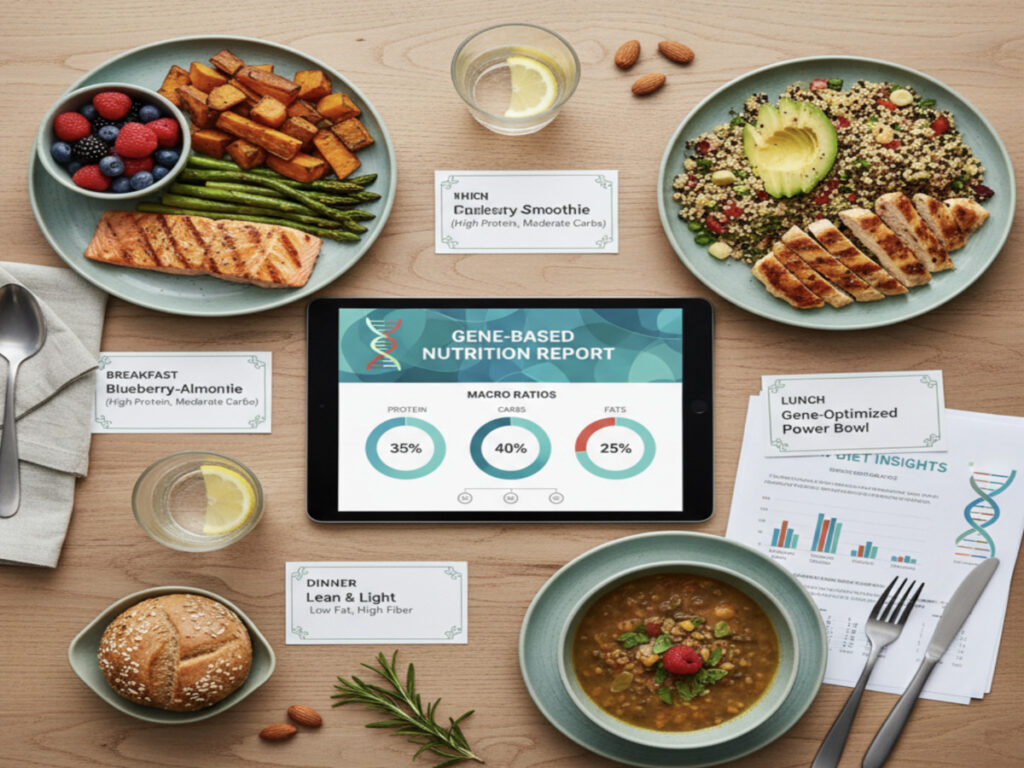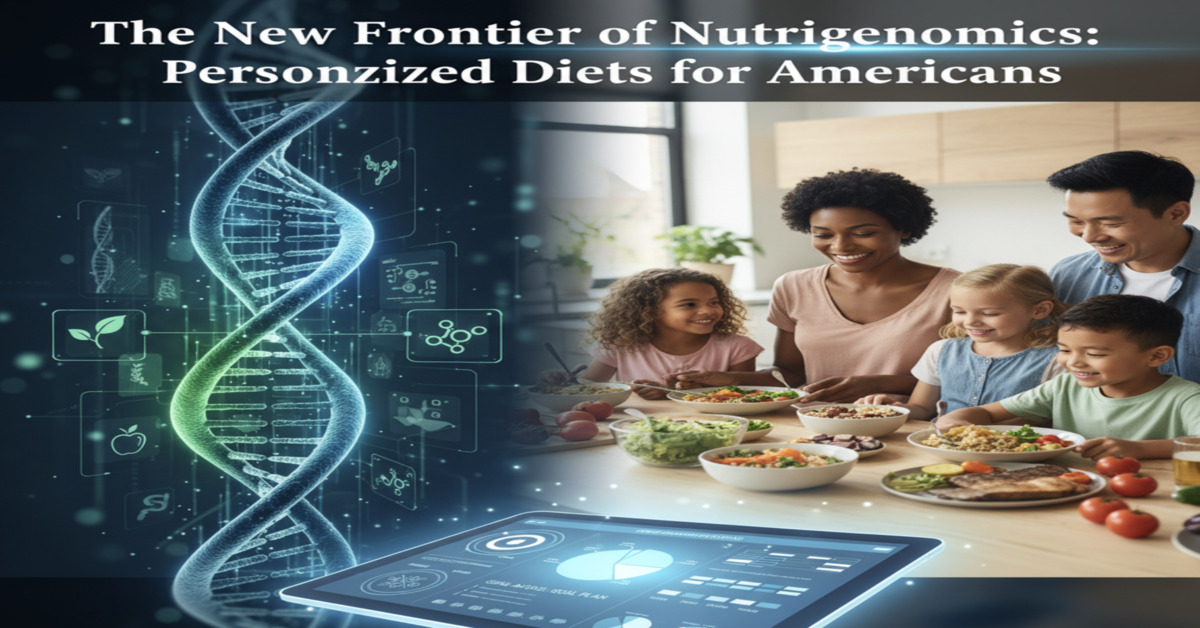Introduction
Americans are shifting away from one-size-fits-all diets toward personalized nutrition solutions. With rising interest in genetic testing and preventive health, nutrigenomics—the study of how genes interact with nutrients—has become one of the most promising frontiers in wellness science.
This article explores the fundamentals of nutrigenomics, how it works, and most importantly, how everyday Americans can apply it in practical, safe, and affordable ways.
What Is Nutrigenomics?
Nutrigenomics is the study of how an individual’s genetic makeup influences their response to nutrients, diets, and supplements.
In simpler terms: your DNA can help determine what foods fuel you best, how you metabolize carbs and fats, and even your risk of certain diet-related conditions.

Why Personalized Nutrition Matters in 2025
- Americans spend over $70 billion annually on weight loss programs, many of which fail due to generic approaches.
- Chronic conditions such as obesity, diabetes, and heart disease continue to rise.
- Genetic insights allow for tailored dietary strategies, reducing trial-and-error dieting.
- Advances in testing have made DNA-based nutrition more affordable and accessible.
The Science Behind Nutrigenomics
Nutrigenomics combines:
- Genomics: understanding how genes influence body processes.
- Nutrition science: identifying how food impacts metabolism, inflammation, and energy balance.
- Epigenetics: examining how lifestyle and diet choices affect gene expression over time.
Together, these insights allow for highly customized dietary recommendations.
Benefits of Nutrigenomics for Everyday Americans
- Better weight management through personalized food choices.
- Improved digestion and nutrient absorption.
- Reduced risk of chronic diseases.
- Enhanced energy and athletic performance.
- Guidance on supplement use based on genetic needs.
Key Genes Linked to Nutrition Response
| Gene | Role | Dietary Implications |
|---|---|---|
| FTO | Linked to obesity risk | High protein intake helps counteract effects |
| MTHFR | Folate metabolism | May require more folate-rich foods or supplements |
| APOE | Cholesterol regulation | Certain variants increase risk with high-fat diets |
| CYP1A2 | Caffeine metabolism | Fast vs. slow metabolizers affect coffee tolerance |
| LCT | Lactose digestion | Variants determine lactose intolerance |
Nutrigenomics vs. Traditional Dieting
| Traditional Dieting | Nutrigenomics |
|---|---|
| Generic, one-size-fits-all | DNA-based, personalized |
| Relies on calorie restriction | Focuses on nutrient-gene interaction |
| High trial and error | Evidence-based personalization |
| Often unsustainable | Long-term tailored approach |
Personalized Diet Approaches for Americans
- DNA-based diet plans: Adjusting carbs, fats, and proteins based on genetic markers.
- Caffeine sensitivity: Some thrive on multiple cups of coffee, others experience anxiety or high blood pressure.
- Vitamin and mineral optimization: Genetic testing can reveal tendencies for deficiencies.
- Exercise compatibility: Genes may indicate better response to endurance vs. strength training diets.

Nutrigenomics and Chronic Disease Prevention
Research shows nutrigenomics may help reduce risks for:
- Type 2 diabetes (by tailoring carb intake).
- Cardiovascular disease (dietary fat metabolism varies by APOE gene).
- Obesity (FTO gene variants linked to appetite regulation).
- Cancer risk (epigenetic dietary changes reduce DNA damage).
Ethical and Privacy Concerns
- Genetic data privacy: Americans remain cautious about how companies handle DNA results.
- Health equity: Risk of widening gaps if only wealthy populations can afford testing.
- Clinical validation: More research is needed before nutrigenomics becomes mainstream medical practice.
Cost and Accessibility in the U.S.
- Genetic nutrition tests range from $100 to $400.
- Some insurance plans cover preventive health tools.
- Telehealth platforms are beginning to integrate nutrigenomic counseling.
Expert Insights
Dr. Karen Mitchell, Nutrition Scientist:
“Personalized nutrition based on genetics is not the future—it’s already here. The challenge is making it affordable and accessible to the average American.”
Dr. Anthony Rivera, Geneticist:
“Nutrigenomics is promising, but it must be combined with lifestyle, environment, and behavior data for a truly holistic picture.”
Statistics on Nutrigenomics Adoption
- 1 in 5 Americans has taken a DNA test for health or ancestry (Pew Research, 2024).
- The nutrigenomics market is projected to grow to $30 billion globally by 2030.
- 60% of Americans say they are interested in personalized diet solutions.
Nutrigenomics Myths vs. Facts
| Myth | Fact |
|---|---|
| Nutrigenomics gives instant results | It provides guidance but requires lifestyle changes |
| Only elite athletes benefit | Everyday people can apply it to improve diet and energy |
| It replaces traditional nutrition advice | It complements, not replaces, professional guidance |
| Too expensive for most Americans | Costs are dropping as testing becomes mainstream |
FAQ Section
Q1: Is nutrigenomics safe?
Yes, it is non-invasive since it relies on saliva or cheek swab tests. The key is to choose reputable testing companies.
Q2: Do I need a doctor to interpret my results?
Not always, but consulting a nutritionist trained in nutrigenomics ensures safer application.
Q3: Can nutrigenomics help me lose weight?
Yes, it can guide food choices that align with your metabolism, making weight loss more effective and sustainable.
Q4: Is it worth the cost?
If generic diets have failed, nutrigenomics may save money long-term by reducing trial and error.
Authoritative Resources
- National Human Genome Research Institute
- Academy of Nutrition and Dietetics
- NIH – Nutrigenomics Research
Actionable Checklist
- Research reliable nutrigenomics testing companies.
- Take a genetic nutrition test if affordable.
- Review results with a certified nutritionist.
- Adjust macronutrient ratios based on your gene profile.
- Monitor energy, weight, and mood changes after adjustments.
- Reevaluate annually as science advances.
Conclusion & Call to Action
Nutrigenomics is transforming how Americans think about dieting and wellness. Instead of generic rules, it empowers individuals to align diet with DNA for better energy, weight control, and long-term health.
The key takeaway: genes load the gun, but lifestyle pulls the trigger. With accessible testing and smart application, nutrigenomics can help every American unlock their best version of health.
👉 Want to future-proof your diet? Start by exploring a reputable nutrigenomics test today.


